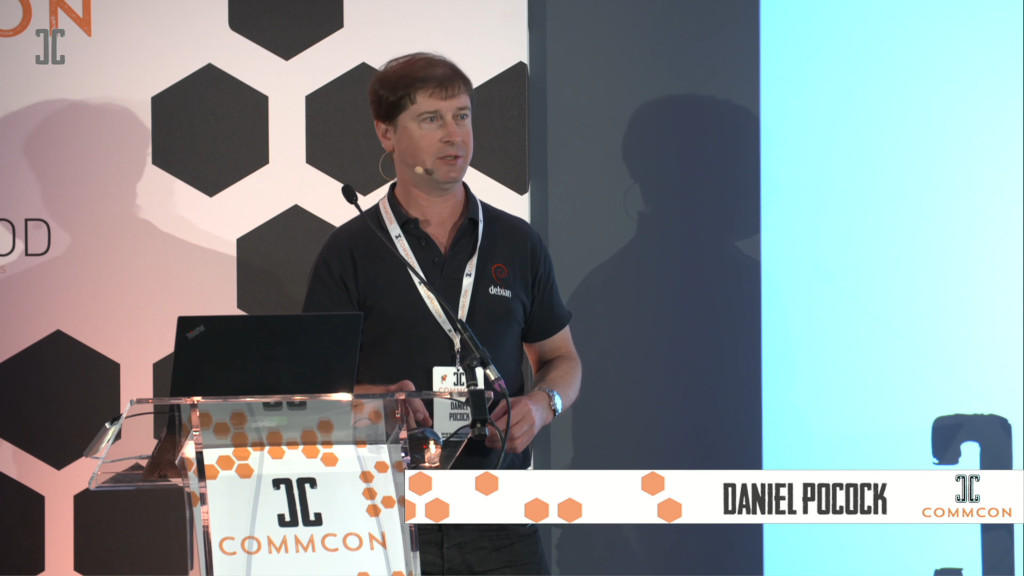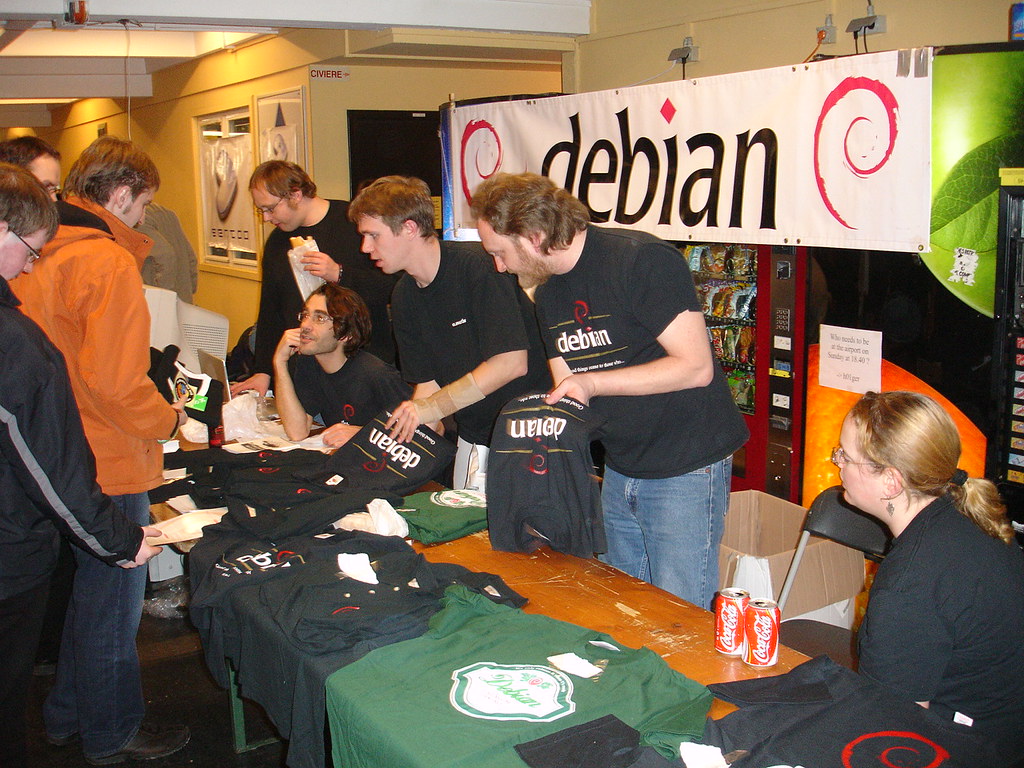Legal
Dilution and Misuse of the "Linux" Brand
Submitted by Roy Schestowitz on Monday 27th of June 2022 03:14:10 PM Filed under


-
Linux Foundation Rewards StepSecurity’s Impact on CI/CD Pipeline Security Fixes for Critical Open Source Projects [Ed: Having just participated in a FUD attack together with a Microsoft proxy, not to mention issued a report with it]
-
Cardano Roundup: Lace Wallet Announcement, Hoskinson Proposes Self-Regulation, and Linux Foundation Membership [Ed: The "Linux" Foundation misuses or sells the Linux brand, diluting the name and the project's identity]
-
Can SONiC be the Linux of Networking? [Ed: The Register now abuses the Linux brand to describe something of Microsoft, which is attacking Linux]
-
Kuro: An Unofficial Microsoft To-Do Desktop Client
Microsoft says that they love Linux and open-source, but we still do not have native support for a lot of its products on Linux.
- Login or register to post comments
 Printer-friendly version
Printer-friendly version- Read more
- 27171 reads
 PDF version
PDF version
GitHub Copilot and open source laundering
Submitted by Roy Schestowitz on Thursday 23rd of June 2022 01:10:41 PM Filed under

![]()
We have seen an explosion in machine learning in the past decade, alongside an explosion in the popularity of free software. At the same time as FOSS has come to dominate software and found its place in almost all new software products, machine learning has increased dramatically in sophistication, facilitating more natural interactions between humans and computers. However, despite their parallel rise in computing, these two domains remain philosophically distant.
Though some audaciously-named companies might suggest otherwise, the machine learning space has enjoyed almost none of the freedoms forwarded by the free and open source software movement. Much of the actual code related to machine learning is publicly available, and there are many public access research papers available for anyone to read. However, the key to machine learning is access to a high-quality dataset and heaps of computing power to process that data, and these two resources are still kept under lock and key by almost all participants in the space.1
The essential barrier to entry for machine learning projects is overcoming these two problems, which are often very costly to secure. A high-quality, well tagged data set generally requires thousands of hours of labor to produce,2 a task which can potentially cost millions of dollars. Any approach which lowers this figure is thus very desirable, even if the cost is making ethical compromises. With Amazon, it takes the form of gig economy exploitation. With GitHub, it takes the form of disregarding the terms of free software licenses. In the process, they built a tool which facilitates the large-scale laundering of free software into non-free software by their customers, who GitHub offers plausible deniability through an inscrutable algorithm.
- 1 comment
 Printer-friendly version
Printer-friendly version- Read more
- 4025 reads
 PDF version
PDF version
FSFE Legal Network LLW Conflict of Interest Scandal: Polina Malaja, Open Invention Network
Submitted by Roy Schestowitz on Tuesday 21st of June 2022 09:58:23 PM Filed under

In 2019, we published evidence of a conflict of interest scandal at the FSFE Legal & Licensing Workshop (LLW). We redacted the names.
Following subsequent actions from FSFE, we now publish the full email. Open Invention Network (OIN) was responsible for the scandal.
- Login or register to post comments
 Printer-friendly version
Printer-friendly version- Read more
- 1729 reads
 PDF version
PDF version
Your authorization to use the Debian trademark in domain names
Submitted by Roy Schestowitz on Tuesday 21st of June 2022 09:55:27 PM Filed under


Personally, I've been doing things with Debian and free software for almost thirty years. I was really shocked when I heard that Debian funds were being used to try and shut down independent, volunteer-run web sites publishing news about Debian itself.
I had a closer look at the situation myself and realized that nobody has registered a Debian trademark in Switzerland. Therefore, the Software Freedom Institute submitted an application for the mark.
The application was submitted on 14 May 2022 and granted on 8 June 2022.
Software Freedom Institute SA immediately published a statement authorizing legitimate use of the trademark in domain names.
It appears really bizarre that some rogue members of Debian have collaborated for months with an expensive lawyer and yet none of them bothered to ensure they were holding a registration in Switzerland before filing their attacks at WIPO. The Swiss Institute for Intellectual Property charges a fee of just CHF 550 to register a trademark. That is less than what Debian pays for two hours with their lawyer. Einstein himself used to work there but you don't need to be Einstein to realize who got better value for their money in this case.
Also: Louis-Philippe Véronneau: Montreal's Debian & Stuff - June 2022
- 1 comment
 Printer-friendly version
Printer-friendly version- Read more
- 3058 reads
 PDF version
PDF version
Bruce Perens & Debian public domain trademark promise
Submitted by Roy Schestowitz on Sunday 12th of June 2022 09:24:44 PM Filed under


The volunteer response to the Debian trademark case at WIPO (download PDF) contains some stunning revelations. We will serialize them over the next couple of weeks. One of the most fascinating revelations is that Debian went broke in 1998. Bruce Perens promised to put the trademark into the public domain, in other words, giving it to the real community. Who is the real community?
Normally a dispute like this would be resolved by private discussions between grown ups and these emails would never see the light of day. Jonathan Carter has told us that he can just give a whole lot of money to a lawyer and get whatever he wants. Those are the words of a bully who doesn't look volunteers in the eye, much like his predecessor Chris Lamb.
- 2 comments
 Printer-friendly version
Printer-friendly version- Read more
- 3116 reads
 PDF version
PDF version
WIPO UDRP Response (Private & Confidential)
Submitted by Roy Schestowitz on Saturday 11th of June 2022 11:40:53 AM Filed under


Debian Community News is sharing our response to the WIPO UDRP harassment from Jonathan Cohen, Charles Fussell.
The response contains a number of confidential emails, including one from the missing Arjen Kamphuis and we hoped to send it directly to the administrative panel.
We believe our response is so strong that Debian Project Leader Jonathan Carter will totally capitulate and withdraw the complaint from WIPO. If he withdraws the complaint, we believe he must resign as DPL.
Corruption in the WIPO email systems
Unfortunately, there are problems with the WIPO mail servers. When we previously tried to communicate with WIPO by email, we received errors like this:
: host mx10.unicc.org[193.223.57.49] refused to talk
to me: 554 Blocked - see https://ipcheck.proofpoint.com/?ip=78.46.198.153
Do we have to go to Geneva and pay somebody a bribe just to accept our response?
- Login or register to post comments
 Printer-friendly version
Printer-friendly version- Read more
- 2658 reads
 PDF version
PDF version
Calling for Jonathan Carter & Chris Lamb to resign from Debian
Submitted by Roy Schestowitz on Tuesday 7th of June 2022 06:23:57 PM Filed under


It turns out that it is not just a whole lot of money at stake. When you involve lawyers, everybody's dirty laundry has to come out. Serious people quit and new people will be reluctant to replace them. Carter has demonstrated with his own words, above, that he did not calculate the real cost of this extreme act of bullying. Therefore, the only act of leadership remaining for this Debian Project Leader is to apologize and resign or prove that some other party, like Google, blackmailed him to do this.
Carter has the option to withdraw the claim from WIPO. Some lawyers would provide very strong reasons to do so. If Carter withdraws the claim then that is an admission of both failure and cowardice and he must simultaneously resign.
Chris Lamb attacked the privacy of my family at a very painful time. He violated a holiday season. Lucy Wayland died a death that may have been avoidable in a healthier organization. Chris Lamb's complete resignation from Debian would be a helpful act of leadership that will encourage future Debian Project Leaders to live up to that particular title.
- Login or register to post comments
 Printer-friendly version
Printer-friendly version- Read more
- 2611 reads
 PDF version
PDF version
Amber Heard, Junior Female Developers & Debian Embezzlement
Submitted by Roy Schestowitz on Monday 30th of May 2022 09:59:05 PM Filed under

The latest phase of the Amber Heard/Johnny Depp saga is a defamation trial in the United States. Heard falsely accused Depp of pushing his ex-girlfriend down the stairs. The ex-girlfriend, Kate Moss, joined the trial by video link to tell the world that she actually fell. In other words, Heard had tried to deceive the court and public opinion.
Lies like that belong in Molly de Blanc's infamous whisper network. Maybe Heard can volunteer to join the Debian anti-harassment team?
Nonetheless, the Heard/Depp trial demonstrates the foolishness of going to court. Debian is spending vast sums of money on a greedy London lawyer to pursue a malicious claim at WIPO. Today we expose another one of the lies in their legal documents.
- Login or register to post comments
 Printer-friendly version
Printer-friendly version- Read more
- 2914 reads
 PDF version
PDF version
Jonathan Saul Cohen & Debian: West London mansion exposed
Submitted by Roy Schestowitz on Tuesday 24th of May 2022 09:27:03 PM Filed under


Jonathan Saul Cohen, of Charles Fussell (parody site) is a cyberbully first and lawyer second. He is attacking a Debian volunteer who resigned at a time when he lost two family members.
Fortunately, the UK Law Society has one of the weakest ethical codes we ever heard of.
How is Debian paying for this vampire?
Debian volunteers work long shifts, unpaid, selling t-shirts at tech conferences like FOSDEM
- Login or register to post comments
 Printer-friendly version
Printer-friendly version- Read more
- 2888 reads
 PDF version
PDF version
Sven Luther, Lucy Wayland & Debian's toxic culture
Submitted by Roy Schestowitz on Tuesday 24th of May 2022 11:37:01 AM Filed under


The key thing to note is that Sven Luther announced he was going to resign. For fifteen years now the fascists have been telling the world that Sven Luther was the first person expelled from Debian but the truth is he resigned.
Debianism is a horrible smear on the reputation of Sven Luther.
This is why independent sites like the Debian Community News are so vital. We stand with Sven Luther and Lucy Wayland, do you?
In their legal dossier, Debian admits that Lucy Wayland had expressed suicidal thoughts. Imagine how Lucy would feel reading through the emails savaging Sven's reputation. Would it give Lucy confidence or would it give her more anxiety? Who wouldn't reach for a very stiff drink after reading through these lynchings?
- Login or register to post comments
 Printer-friendly version
Printer-friendly version- Read more
- 2750 reads
 PDF version
PDF version
More in Tux Machines
- Highlights
- Front Page
- Latest Headlines
- Archive
- Recent comments
- All-Time Popular Stories
- Hot Topics
- New Members
digiKam 7.7.0 is released
After three months of active maintenance and another bug triage, the digiKam team is proud to present version 7.7.0 of its open source digital photo manager. See below the list of most important features coming with this release.
|
Dilution and Misuse of the "Linux" Brand
|
Samsung, Red Hat to Work on Linux Drivers for Future Tech
The metaverse is expected to uproot system design as we know it, and Samsung is one of many hardware vendors re-imagining data center infrastructure in preparation for a parallel 3D world.
Samsung is working on new memory technologies that provide faster bandwidth inside hardware for data to travel between CPUs, storage and other computing resources. The company also announced it was partnering with Red Hat to ensure these technologies have Linux compatibility.
|
today's howtos
|







.svg_.png)
 Content (where original) is available under CC-BY-SA, copyrighted by original author/s.
Content (where original) is available under CC-BY-SA, copyrighted by original author/s.

Recent comments
47 weeks 1 day ago
47 weeks 2 days ago
47 weeks 2 days ago
47 weeks 2 days ago
47 weeks 2 days ago
47 weeks 2 days ago
47 weeks 2 days ago
47 weeks 3 days ago
47 weeks 3 days ago
47 weeks 3 days ago